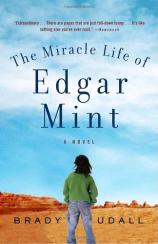Reading Group Guide
Discussion Questions
The Miracle Life of Edgar Mint: A Novel

1. "If I could tell you only one thing about my life it would be this: when I was seven years old the mailman ran over my head. As formative events go, nothing else comes close; my careening, zigzag existence, my wounded brain and faith in God, my collisions with joy and affliction, all of it has come, in one way or another, out of that moment on a summer morning when the left rear tire of a United States postal jeep ground my tiny head into the hot gravel of the San Carlos Apache Indian Reservation" [p.13]. How does the novel's opening paragraph—and more broadly its opening chapter—work to draw the reader into the story? How does the immediacy of the first-person narration affect the reader's involvement with Edgar and his story?
2. Edgar's mother doesn't even get up from the kitchen table when he is run over by the mail truck [p. 16]. Why is Edgar so forgiving of her, even though she abandons him and effectively kills herself with alcohol? Does she provoke any sympathy in the reader?
3. Edgar's father is a young white man from Connecticut who has come west in the hope of becoming a cowboy. Is it surprising that Edgar never meets or even tries to find his real father? Which characters take on parental roles in his life?
4. On arriving at Willie Sherman, Edgar overhears Principal Whipple say, "The last thing I need right now is another goddamn orphan without any paperwork." In response to hearing the word "orphan," Edgar thinks, "It comforted me to understand my place in the world, to put a name to it" [p. 107]. Is it useful to see The Miracle Life of Edgar Mint as an example of the classic genre of orphan novels, like Dickens' Great Expectations? How loosely or tightly structured is The Miracle Life of Edgar Mint? What are the driving forces behind the novel's plot?
5. What is the effect of the chapter called "Edgar Gets It," which is Edgar's and the reader's introduction to life at Willie Sherman. Why are violence and sadism so casual here? What effect does the school have on Edgar's behavior? What changes does he make in himself in order to survive?
6. Edgar is "obsessed with memory, with facts, with history on the smallest scale" [p. 14]. He makes daily use of the typewriter Art has given him. What does language do for Edgar? Why is it so necessary for him to write down what happens to him?
7. What does Edgar's friendship with Cecil mean to him? If thinking about and writing to Cecil have become some of Edgar's few emotional lifelines, what is the significance of the events that occur when he makes his visit to the juvenile detention center [pp. 301–309]?
8. Note that Udall's use of narrative point of view often switches between first and third person [see, for instance, the first two paragraphs on page 215]. Why does he choose to do this? Who is telling the story?
9. What does Sterling Yakezevitch represent to Edgar? Why does Edgar say to himself, "I was just like Sterling Yakezevitch. I knew it, but nobody else seemed to" [p. 193]? What is the significance of "the jumping place" for Edgar and for Sterling?
10. Udall does a superb job of incorporating the landscape of the West into the story. What are the scenes in which the landscape plays an important role? How does the landscape affect the moods and meanings of the novel? Is there any significance to the fact that Edgar ends up in Pennsylvania, far from his Apache homeland?
11. How well does Edgar fit into the Madsen family? Does he have a chance for happiness there? Why does he leave, and is he right to do so?
12. Barry Pinkley's role in the story evolves over the course of Edgar's life. Edgar says, "Like Dr. Frankenstein who gave the monster life, I think Barry felt a kind of ownership toward me, a responsibility" [p. 25]. Does Barry's history as a foster child explain his behavior? Edgar also says, "Barry was a mystery to me . . . I knew that he loved me, in his own way, more than anyone in my life ever had" [p. 347]. Despite Barry's constant attention and love, why does Edgar reject him as a possible adoptive parent? What compels Edgar to perform his ultimate act of rejection? Is it shocking or unsurprising that he does so?
13. Edgar says, "God was out there. He had touched me and I had felt His presence, which was more than I could say about my own father." But he also believes that "either God was a crazed lunatic or He was just plain mean" [p. 311]. How important is religion in this novel?
14. Edgar is a child with no home and almost no belongings. What particular objects take on meaning for him? What is the significance of the objects that are given and received in friendship in this story? What is the significance of his trunk?
15. How significant for Edgar's story is the fact that he is half Apache? What does the novel tell us about racial discrimination and its effect on Native Americans? How interested is Udall in bringing the reader's attention to the problems bequeathed to the Native American population?
16. There is much in The Miracle Life of Edgar Mint that is bleak—suicide, alcoholism, drug addiction, physical suffering, emotional deprivation. Which aspects or episodes of the novel are the most difficult for the reader from an emotional perspective? How does Udall manage to keep the mood so light, comical, and life-affirming?
17. Apart from his brilliance as an inventor of character and plot, what aspects of Udall's writing style are most impressive? Are there particular sentences or paragraphs that are especially moving, effective, or funny?
18. Edgar's lifelong quest is to relieve the postman of guilt, to bring him the good news of his survival. "I imagined him with his white skin, his orange hair and blue uniform . . . transformed in an instant from a man twisted inside out with guilt and grief to someone struck with the realization that our worst mistakes can be retrieved, that death can be traded in for life, that what has been destroyed can be made whole again" [p. 312]. Why does Udall deny him this wish? Is finding a long-lost mother in Rosa a good enough substitute for his original wish? What are the ironies of the novel's ending?
The Miracle Life of Edgar Mint: A Novel
- Publication Date: May 21, 2002
- Paperback: 432 pages
- Publisher: Vintage
- ISBN-10: 0375719180
- ISBN-13: 9780375719189








